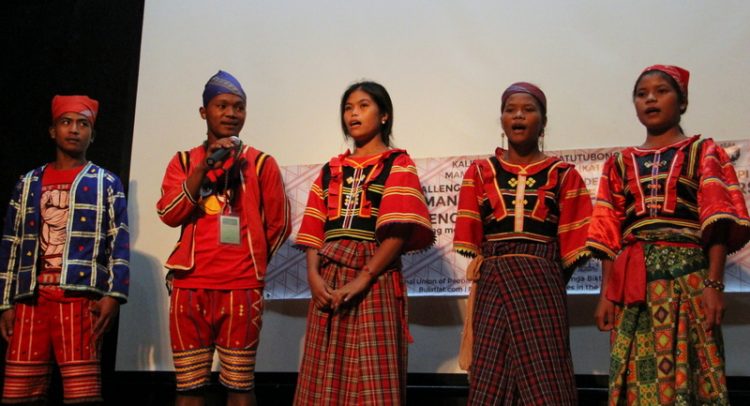Quezon City – Business interests are endangering indigenous peoples’ (IP) lives.
This is what IPs from across the country declared during ‘Business, Human Rights and the State of Affairs of Indigenous Peoples in the Philippines’ public forum held at the Bantayog ng mga Bayani Auditorium.
‘The indigenous peoples of the Philippines continue to lose our homes, resources, livelihood and even our lives as the Philippine state declared our lands as part of the public domain, open for economic exploitation and so-called ‘development’ projects,” said Pya Malayao, Katribu secretary general, as she delivered the situation of the indigenous peoples in the Philippines.
Katribu said there were at least 229 approved mining applications, which encroach 542,000 hectares of ancestral territories. In addition, the group said, new economic zones and dams being built on ancestral lands, and the Duterte administration has clinched new deals for oil palm plantation expansion covering more than 1 million hectares of land in Mindanao and Palawan.
 Rev. Fr. Rex RB. Reyes, Jr., National Council of Churches in the Philippines (NCCP) general secretary, an Igorot himself, noted: “When the people stand up for their rights for a clean and healthy environment and to preserve their way of life, state forces are used to ensure the interests of big businesses.”
Rev. Fr. Rex RB. Reyes, Jr., National Council of Churches in the Philippines (NCCP) general secretary, an Igorot himself, noted: “When the people stand up for their rights for a clean and healthy environment and to preserve their way of life, state forces are used to ensure the interests of big businesses.”
“Most often than not, the civil and political rights of indigenous people are violated, including the most basic of rights and God’s precious gift – life… This is especially true when the police and the military are utilized as investment defense forces,” he added.
The forum was organized by the Katribu Kalipunan ng Katutubong Mamayan sa Pilipinas (KAMP/Katribu) and National Council of Churches in the Philippines (NCCP) as part of the month-long commemoration of the International Day of the World’s Indigenous Peoples.
The First Secretary of the EU Delegation to the Philippines, Jérôme Rivière, said in his remarks: “The European Union believes that the indigenous peoples deserve a better life, a better treatment based on respect for dignity and self-determination. The EU has a long history of cooperation with indigenous peoples, including in Asia.
 Our aim is to help empower them and integrate their concerns into EU policies, programmes and projects. The EU considers indigenous peoples as peoples of concern because of their vulnerabilities.”
Our aim is to help empower them and integrate their concerns into EU policies, programmes and projects. The EU considers indigenous peoples as peoples of concern because of their vulnerabilities.”
 A highlight of the forum was the presentation of a study paper. Rey Paulin, KAMP research and public information officer, in his presentation, claimed that “the indigenous peoples have suffered negative human rights impacts due to the government’s land deals as it offers the remaining lands and natural resources of indigenous peoples to big businesses like large-scale mining and logging. This puts pressure on the IPs’ culture and way of life.”
A highlight of the forum was the presentation of a study paper. Rey Paulin, KAMP research and public information officer, in his presentation, claimed that “the indigenous peoples have suffered negative human rights impacts due to the government’s land deals as it offers the remaining lands and natural resources of indigenous peoples to big businesses like large-scale mining and logging. This puts pressure on the IPs’ culture and way of life.”
IP-related and other rights groups sat as reactors to the study paper.
The forum also included testimonies from grassroots IP organizations in Mindanao, Visayas and Northern Luzon giving the attendees a picture of local experiences.
 ‘The key to long lasting peace for IPs is the protection of our inherent, prior, existing and inalienable right to our ancestral territories and its indivisible, inter-related and interdependent right to self-determination,” Malayao said. ###
‘The key to long lasting peace for IPs is the protection of our inherent, prior, existing and inalienable right to our ancestral territories and its indivisible, inter-related and interdependent right to self-determination,” Malayao said. ###
